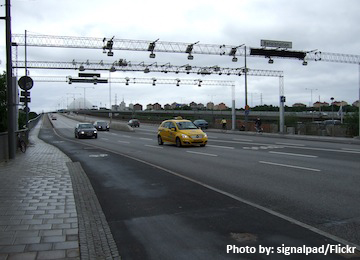
Congestion charge per km mooted
A new study for the Brussels capital region in Belgium analyses the merits of a congestion charge with a fee per kilometre travelled.
Interested in this kind of news?
Receive them directly in your inbox. Delivered once a week.
The study, which looks at satellite-based distance charging for cars, was ordered in 2010 as part of measures to reduce congestion and benefit society and the environment. It looked at different levels of charging under both systems and looked at political acceptability and the likely reduction in traffic.
For the congestion charge, it concluded that €3 per day would be the optimum level (likely to cause an 11% reduction in traffic in Brussels), while a satellite-based system would best charge €0.07 per kilometre (likely to reduce traffic by 10%). Higher charges would in theory bring about a greater reduction, but they would stumble across the problem of political acceptability.
T&E’s Brussels-based member Brusselse Raad voor het Leefmilieu (Bral) has been closely following the emerging results, and it favours a congestion charge. It is not against a kilometre charge, but cites the report’s findings that a congestion charge would be easier and cheaper to introduce and would be more beneficial socially. A satellite-based kilometre charge would require an agreement between Brussels and the Flemish and French-speaking regions of Belgium, whereas the Belgian capital could (in theory) introduce a congestion charge on its own.
‘A big factor is the workforce in Brussels,’ says Jeroen Verhoeven of Bral. ‘We have a high level of unemployment among unskilled workers, and a congestion charge would bring in money to boost public transport, thereby creating semi-skilled jobs, whereas a satellite-based system would create fewer jobs, they would be skilled jobs, and there would be much less revenue for public transport because the technology is expensive. With 40% of Brussels households having no access to a car, this is a powerful argument.’
Employer and business associations have given support for the kilometre charge, mainly because they see it avoiding competition between Brussels and the Flanders and Walloon regions. But support among Belgium’s political parties for a kilometre charge melted away before recent elections.
A handful of cities have congestion charges (notably London and Stockholm, pictured) while several countries have kilometre charges for lorries (notably Germany and Switzerland), but only Portugal has a kilometre charge for cars, and it is not satellite-based.
This is the first in a series of stories brought to T&E’s attention by a member organisation. If you wish to bring a story to our attention, please contact Chris Bowers at editor@transportenvironment.org.
